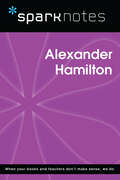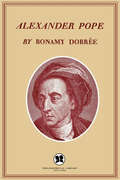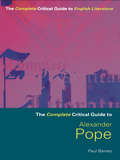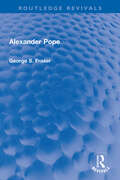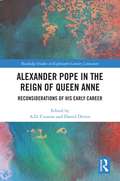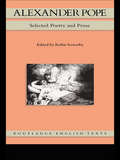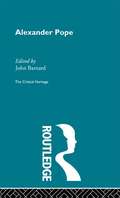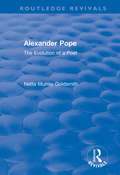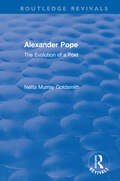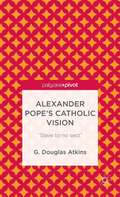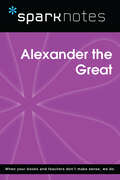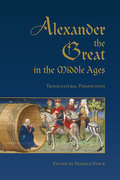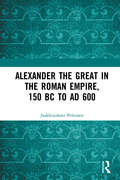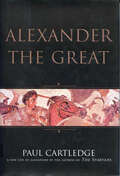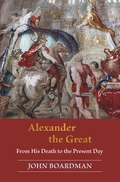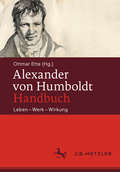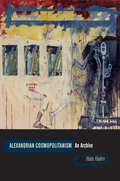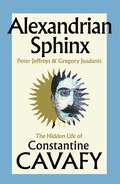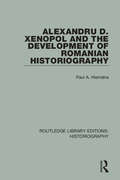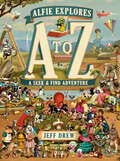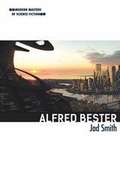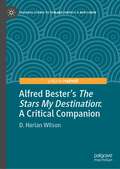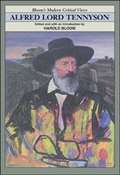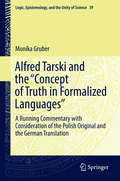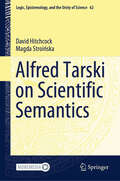- Table View
- List View
Alexander Hamilton (SparkNotes Biography Guide)
by SparkNotesAlexander Hamilton (SparkNotes Biography Guide) Making the reading experience fun! SparkNotes Biography Guides examine the lives of historical luminaries, from Alexander the Great to Virginia Woolf. Each biography guide includes: An examination of the historical context in which the person lived A summary of the person&’s life and achievements A glossary of important terms, people, and events An in-depth look at the key epochs in the person&’s career Study questions and essay topics A review test Suggestions for further reading Whether you&’re a student of history or just a student cramming for a history exam, SparkNotes Biography guides are a reliable, thorough, and readable resource.
Alexander Pope
by Bonamy DobreeA biographical and critical study. From a life so crammed with incident, Mr. Dobre has chosen those facts which seem most to bear on the poet's development in life through art.
Alexander Pope (Routledge Guides to Literature)
by Paul BainesSo many questions surround the key figures in the English literary canon, but most books focus on one aspect of an author's life or work, or limit themselves to a single critical approach. Alexander Pope is a comprehensive, user-friendly guide which: * offers information on Pope's life, contexts and works * outline the major critical issues surrounding his works, from the time they were written to the present *explains the full range of different critical views and interpretations * offers guides to further reading in each area discussed.
Alexander Pope (Routledge Revivals)
by G.S. FraserFirst published in 1978, Alexander Pope is an introduction to Pope’s life and work, which sets the poet solidly in his age and relates the liveliness and variety of his poetry to the strange combination of chronic invalidism and a sociable disposition which marked his life. G. S. Fraser argues that Pope is a more varied figure than his reputation as a great satirist indicates and that he is in some ways more a survivor from the Restoration than a precursor of middle-class morality. Special attention is paid to the poems in the first Collected Works of 1717, which displays both Pope’s gaiety and his sense of colour and beauty. The dignity of his translation of Homer and the thoughtfulness and piety of An Essay on Man are also emphasised. His satirical genius, which found its greatest expression during the later years of declining health, is not ignored but set in perspective. Many readers of this persuasively argued study will be surprised to discover in it a gayer, more warm-hearted and more likeable Pope than they had, perhaps, imagined. Students of English literature will find this book immensely refreshing.
Alexander Pope in The Reign of Queen Anne: Reconsiderations of His Early Career (Routledge Studies in Eighteenth-Century Literature)
by Daniel Derrin A. D. CousinsThis is the first collection of essays since George Sherburn’s landmark monograph The Early Career of Alexander Pope (1934) to reconsider how the most important and influential poet of eighteenth-century Britain fashioned his early career. The volume covers Pope’s writings from across the reign of Queen Anne and just beyond. It focuses, in particular, on his interaction with the courtly culture constellated round the Queen. It examines, for instance, his representations of Queen Anne herself, his portrayals of politics and patronage under her reign, his negotiations with current literary theory, with the classical tradition, with chronologically distant yet also contemporaneous English poets, with current thought on the passions, and with membership of a religious minority. In doing so, it comprehensively reconsiders anew the ways in which Pope, increasingly supportive of Anne’s rule and mindful of the Virgilian rota, sought at first to realise his authorial aspirations.
Alexander Pope: Selected Poetry and Prose (Routledge English Texts #Vol. Xi)
by Alexander PopeAlexander Pope's technical polish and intellectual poise appeal to the subtlest audience. This selection includes The Rape of the Lock, Eloisa to Abelard, and extracts from The Dunciad and the translation of Homer.
Alexander Pope: The Critical Heritage (Critical Heritage Ser.)
by John BarnardThe Critical Heritage gathers together a large body of critical sources on major figures in literature. Each volume presents contemporary responses to a writer's work, enabling students and researchers to read for themselves, for example, comments on early performances of Shakespeare's plays, or reactions to the first publication of Jane Austen's novels.The carefully selected sources range from landmark essays in the history of criticism to journalism and contemporary opinion, and little published documentary material such as letters and diaries. Significant pieces of criticism from later periods are also included, in order to demonstrate the fluctuations in an author's reputation.Each volume contains an introduction to the writer's published works, a selected bibliography, and an index of works,authors and subjects.The Collected Critical Heritage set will be available as a set of 68 volumes and the series will also be available in mini sets selected by period (in slipcase boxes) and as individual volumes.
Alexander Pope: The Evolution of a Poet (Routledge Revivals)
by Netta Murray GoldsmithThis title was first published in 2002: Making use of the growing body of research in recent years on the nature of creativity, Netta Goldsmith here presents a new view of the famous poet whose personality has long frustrated scholars as elusive. Goldsmith tells the story of Pope's life so as to show the factors-personal and public, psychological and social-which shaped his character and enabled him to secure widespread recognition as a major poet. Discussions of significant works are integrated into the narrative covering main events and key relationships, as well as illustrating points made throughout about Pope's approach to his art. Among other things this book shows how vulnerable Pope felt as a Papist in a time of endemic Jacobite activity, and how his fear of possible prosecution for sedition determined much of his conduct and the way he shaped his career. Alexander Pope: The evolution of a poet not only provides a fresh perspective on Pope, but also on the very nature of literary creativity.
Alexander Pope: The Evolution of a Poet (Routledge Revivals)
by Netta Murray GoldsmithThis title was first published in 2002: Making use of the growing body of research in recent years on the nature of creativity, Netta Goldsmith here presents a new view of the famous poet whose personality has long frustrated scholars as elusive. Goldsmith tells the story of Pope's life so as to show the factors-personal and public, psychological and social-which shaped his character and enabled him to secure widespread recognition as a major poet. Discussions of significant works are integrated into the narrative covering main events and key relationships, as well as illustrating points made throughout about Pope's approach to his art. Among other things this book shows how vulnerable Pope felt as a Papist in a time of endemic Jacobite activity, and how his fear of possible prosecution for sedition determined much of his conduct and the way he shaped his career. Alexander Pope: The evolution of a poet not only provides a fresh perspective on Pope, but also on the very nature of literary creativity.
Alexander Pope’s Catholic Vision: "Slave to no sect"
by G. Douglas AtkinsA fresh look at the greatest poet of early eighteenth-century England, this highly readable book focuses on Pope's religious thinking and major poems. G. Douglas Atkins extends the argument that the Roman Catholic poet was no Deist, 'closet' or otherwise.
Alexander the Great (SparkNotes Biography Guide)
by SparkNotesAlexander the Great (SparkNotes Biography Guide) Making the reading experience fun! SparkNotes Biography Guides examine the lives of historical luminaries, from Alexander the Great to Virginia Woolf. Each biography guide includes: An examination of the historical context in which the person lived A summary of the person&’s life and achievements A glossary of important terms, people, and events An in-depth look at the key epochs in the person&’s career Study questions and essay topics A review test Suggestions for further reading Whether you&’re a student of history or just a student cramming for a history exam, SparkNotes Biography guides are a reliable, thorough, and readable resource.
Alexander the Great in the Middle Ages
by Markus StockIn the Middle Ages, the life story of Alexander the Great was a well-traveled tale. Known in numerous versions, many of them derived from the ancient Greek Alexander Romance, it was told and re-told throughout Europe, India, the Middle East, and Central Asia. The essays collected in Alexander the Great in the Middle Ages examine these remarkable legends not merely as stories of conquest and discovery, but also as representations of otherness, migration, translation, cosmopolitanism, and diaspora.Alongside studies of the Alexander legend in medieval and early modern Latin, English, French, German, and Persian, Alexander the Great in the Middle Ages breaks new ground by examining rarer topics such as Hebrew Alexander romances, Coptic and Arabic Alexander materials, and early modern Malay versions of the Alexander legend. Brought together in this wide-ranging collection, these essays testify to the enduring fascination and transcultural adaptability of medieval stories about the extraordinary Macedonian leader.
Alexander the Great in the Roman Empire, 150 BC to AD 600
by Jaakkojuhani PeltonenThe life of Alexander the Great began to be retold from the moment of his death. The Greco-Roman authors used these stories as exemplars in a variety of ways. This book is concerned with the various stories of Alexander and how they were used in antiquity to promote certain policies, religious views, and value systems.The book is an original contribution to the study of the history and reception of Alexander, analysing the writings of over 70 classical and post-classical authors during a period of over 700 years. Drawing on this extensive range and quantity of material, the study plots the continuity and change of ideas from the early Roman Empire to the early Middle Ages.
Alexander the Great: A New Life of Alexander
by Paul CartledgePaul Cartledge, one of the world’s foremost scholars of ancient Greece, illuminates the brief but iconic life of Alexander (356-323 BC), king of Macedon, conqueror of the Persian Empire, and founder of a new world order. Alexander's legacy has had a major impact on military tacticians, scholars, statesmen, adventurers, authors, and filmmakers. Cartledge brilliantly evokes Alexander's remarkable political and military accomplishments, cutting through the myths to show why he was such a great leader. He explores our endless fascination with Alexander and gives us insight into his charismatic leadership, his capacity for brutality, and his sophisticated grasp of international politics. Alexander the Great is an engaging portrait of a fascinating man, and a welcome balance to the myths, legends, and often skewed history that have obscured the real Alexander.
Alexander the Great: From His Death to the Present Day
by John BoardmanAn illustrious scholar presents an elegant, concise, and generously illustrated exploration of Alexander the Great’s representations in art and literature through the agesJohn Boardman is one of the world’s leading authorities on ancient Greece, and his acclaimed books command a broad readership. In this book, he looks beyond the life of Alexander the Great in order to examine the astonishing range of Alexanders created by generations of authors, historians, and artists throughout the world—from Scotland to China.Alexander’s defeat of the Persian Empire in 331 BC captured the popular imagination, inspiring an endless series of stories and representations that emerged shortly after his death and continues today. An art historian and archaeologist, Boardman draws on his deep knowledge of Alexander and the ancient world to reflect on the most interesting and emblematic depictions of this towering historical figure.Some of the stories in this book relate to historical events associated with Alexander’s military career and some to the fantasy that has been woven around him, and Boardman relates each with his customary verve and erudition. From Alexander’s biographers in ancient Greece to the illustrated Alexander “Romances” of the Middle Ages to operas, films, and even modern cartoons, this generously illustrated volume takes readers on a fascinating cultural journey as it delivers a perfect pairing of subject and author.
Alexander von Humboldt-Handbuch: Leben – Werk – Wirkung
by Ottmar EtteAlexander von Humboldt ist seit dem Ausgang des 20. Jahrhunderts in den unterschiedlichsten Wissensbereichen und Wissenschaftsfeldern zu einer bedeutenden Figur im öffentlichen Diskurs geworden. Das Handbuch macht das gewaltige Oeuvre Humboldts zugänglich und beschreibt Wege und Wirkungen dieses herausragenden Forschers, Gelehrten und Schriftstellers. Ausgehend von der Einsicht in die transdisziplinäre Ausrichtung der Humboldtschen Wissenschaft rekonstruiert es Verbindungen und Wechselwirkungen der unterschiedlichen Betätigungsfelder dieses Vordenkers einer vernetzten Welt. Im Werkteil werden nicht nur die großen Buchpublikationen, sondern auch die unselbständigen Schriften, die umfangreiche Korrespondenz und der Nachlass behandelt. Humboldts wissenschaftliche Aktivitäten werden aus unterschiedlichen Blickwinkeln, von der Wissenschaftsgeschichte und den Naturwissenschaften bis hin zu Geschichts- und Sprachwissenschaft beleuchtet. Auch seine Tätigkeitsfelder in den Bereichen Politik und Diplomatie oder Kunst und Ästhetik werden diskutiert, schließlich die wichtigsten seiner Beziehungen zu Wissenschaftlern und Literaten.
Alexandrian Cosmopolitanism: An Archive
by Hala HalimInterrogating how Alexandria became enshrined as the exemplary cosmopolitan space in the Middle East, this book mounts a radical critique of Eurocentric conceptions of cosmopolitanism. The dominant account of Alexandrian cosmopolitanism elevates things European in the city’s culture and simultaneously places things Egyptian under the sign of decline. The book goes beyond this civilization/barbarism binary to trace other modes of intercultural solidarity.Halim presents a comparative study of literary representations, addressing poetry, fiction, guidebooks, and operettas, among other genres. She reappraises three writers—C. P. Cavafy, E. M. Forster, and Lawrence Durrell—who she maintains have been cast as the canon of Alexandria. Attending to issues of genre, gender, ethnicity, and class, she refutes the view that these writers’ representations are largely congruent and uncovers a variety of positions ranging from Orientalist to anticolonial. The book then turns to Bernard de Zogheb, a virtually unpublished writer, and elicits his camp parodies of elite Levantine mores in operettas, one of which centers on Cavafy. Drawing on Arabic critical and historical texts, as well as contemporary writers’ and filmmakers’ engagement with the canonical triumvirate, Halim orchestrates an Egyptian dialogue with theEuropean representations.
Alexandrian Sphinx: The Hidden Life of Constantine Cavafy
by Gregory Jusdanis Peter JeffreysA gripping and revealing new biography of one of the greatest of modern poets, the queer, Greek-Egyptian Constantine Cavafy, whose admirers have ranged from E.M. Forster, T.S. Eliot and Virginia Woolf to Jackie Onassis, Leonard Cohen and Stephen Fry.In this illuminating book, Peter Jeffreys and Gregory Jusdanis reveal Cavafy as a troubled, brilliant poet who sacrificed love for his art and changed the course of world poetry. Alexandrian Sphinx chronicles the extraordinary story of his family, the vicissitudes of their fortunes, and their eventual poverty when they left Egypt and moved to Liverpool, London and Istanbul. As the poet reached adulthood, his story centred on his beloved Alexandria, the city that nourished his imagination and became for him a metaphor of both his poetry and modern life. Deep archival research uncovers the poet&’s relationships with his teenage companions, his friends of middle age, and the individuals whom in later life he enlisted in his steadfast pursuit of fame.Alexandrian Sphinx tells not only of Cavafy&’s life but of his work and his artistic journey, from his early poetic experiments to his startling reinvention in middle age, when he renounced much of what he had written and developed a radical new poetics. Erotic, philosophical, and linguistically suggestive, this widely imitated yet singular style is now recognized and revered as Cavafian.'A deeply researched and engaging biography… Jeffreys and Jusdanis brilliantly recreate Cavafy&’s world&’ - Guardian
Alexandru D. Xenopol and the Development of Romanian Historiography (Routledge Library Editions: Historiography #33)
by Paul A. HiemstraDespite the criticism of his peers and the inattention of his successors, Alexandru Xenopol provided Romanian nationalistic historiography with a greater measure of respectability, especially with the general public. By the time of WWI a strong sense of national identity had become entrenched as an intellectually respectable mentality among Romania’s literate classes. This book examines Xenopol’s participation in the creation of this mentality in Romania during decades that were crucial to the development of institutionalized intellectual life and and educted behaviour in that country.
Alfie Explores A to Z: A Seek-and-Find Adventure (A Look-and-Locate Library Adventure)
by Jeff DrewJoin Alfie the bookworm as he travels through the alphabet from A to Z in this interactive seek-and-find picture book adventure.Meet Alfie the friendly bookworm and his pet dust bunny, Betty! When Betty runs off, Alfie travels through each letter in the alphabet searching for her—and finds much more along the way.From An Awesome Assembly of Animals to a Zamboni Ride Through the Zoo, follow Alfie and discover all the wild wonders of the alphabet—like a bobcat barber blindly buzzing a baboon, and a unicorn on a unicycle playing ukulele! What else can you spot?Part Where's Waldo, part I-Spy, this is an ABCs book unlike any other. Each letter of the alphabet is its own unique destination, with a richly illustrated scene full of creatures, objects, and actions that begin with the corresponding letter, a rhymed poem, and a guide to help young readers decode each scene!Whether reading alone or with the whole family, Alfie's A to Z delivers endless hours of entertainment, and children will love following along with the adorable characters as they learn the alphabet!
Alfred Bester
by Jad SmithAlfred Bester's classic short stories and the canonical novel The Stars My Destination made him a science fiction legend. Fans and scholars praise him as a genre-bending pioneer and cyberpunk forefather. Writers like Neil Gaiman and William Gibson celebrate his prophetic vision and stylistic innovations. Jad Smith traces the career of the unlikeliest of SF icons. Winner of the first Hugo Award for The Demolished Man , Bester also worked in comics, radio, and TV, and his intermittent SF writing led some critics to brand him a dabbler. In the 1960s, however, New Wave writers championed his work, and his reputation grew. Smith follows Bester's journey from consummate outsider to an artist venerated for foundational works that influenced the New Wave and cyberpunk revolutions. He also explores the little-known roots of a wayward journey fueled by curiosity, disappointment with the SF mainstream, and an artist's determination to go his own way.
Alfred Bester’s The Stars My Destination: A Critical Companion (Palgrave Science Fiction and Fantasy: A New Canon)
by D. Harlan WilsonIn this comprehensive study of The Stars My Destination, D. Harlan Wilson makes a case for the continued significance of Alfred Bester’s SF masterwork, exploring its distinctive style, influences, intertextuality, affect, and innovation as well as its extensive metafictional properties. In Stars, Bester established himself as a son of the pulp-SF and high-modernist writers that preceded him and a forefather to the New Wave and cyberpunk movements that followed his lead. Wilson’s study depicts Bester as an SF insider as much as an outlier, writing in the spirit of the genre but breaking with the fixation on hard science in favor of psychological interiority, literary experimentation, and adult themes. The book combines close-readings of the novel with broader concerns about contemporary media, technoculture, and the current state of SF itself. In Wilson’s view, SF is a moribund artform, and Stars foresaw the inevitable science fictionalization of our benighted world. With scholarly lucidity and precision, Wilson shows us that Stars pointed the way to what we have (un)become.
Alfred Lord Tennyson
by Harold BlooomEssays by T. S. Eliot, G. M. Young, Cleanth Brooks, Marshall McLuhan, Robert Langbaum, Christopher Ricks, John Rosenberg, John Hollander, Harold Bloom, A. Dwight Culler, and Robert Bernard Martin.
Alfred Tarski and the "Concept of Truth in Formalized Languages": A Running Commentary with Consideration of the Polish Original and the German Translation (Logic, Epistemology, and the Unity of Science #39)
by Monika GruberThis book provides adetailed commentary on the classic monograph by Alfred Tarski, and offers areinterpretation and retranslation of the work using the original Polish textand the English and German translations. In the original work, Tarski presentsa method for constructing definitions of truth for classical, quantificationalformal languages. Furthermore, using the defined notion of truth, hedemonstrates that it is possible to provide intuitively adequate definitions ofthe semantic notions of definability and denotation and that the notion in astructure can be defined in a way that is analogous to that used to definetruth. Tarski's piece is considered to be one of the major contributions tologic, semantics, and epistemology in the 20th century. However, the authorpoints out that some mistakes were introduced into the text when it wastranslated into German in 1935. As the 1956 English version of the work wastranslated from the German text, those discrepancies were carried over in additionto new mistakes. The author has painstakingly compared the three texts,sentence-by-sentence, highlighting the inaccurate translations, offeringexplanations as to how they came about, and commenting on how they haveinfluenced the content and suggesting a correct interpretation of certainpassages. Furthermore, the author thoroughly examines Tarski's article,offering interpretations and comments on the work.
Alfred Tarski on Scientific Semantics (Logic, Epistemology, and the Unity of Science #62)
by David Hitchcock Magda StroińskaThis book tells the story of the landmark event in modern logic whereby Alfred Tarski became “the man who defined truth”. Alfred Tarski’s classic monograph on truth became known internationally in 1935, when he presented its ideas in German at an international conference and collaborated in preparation of its German translation. This book provides the first English translation of the Polish version of Tarski’s conference paper, which for purposes of comparison is printed side-by-side with a new exact English translation of the German version. It offers for the first time a comprehensive and detailed analysis of the paper, and for the first time a description and analysis of the discussion of the paper immediately after its presentation. It discusses 22 substantive differences between the two versions. The book also extracts from recently discovered correspondence about the German translation of the truth monograph how it was decided to produce such a translation, the process of vetting and changing the translation, changes requested by Tarski, objections to the appeal to intuition in the Polish original (supported by a list of those appeals with their replacements in the German and English translations), other translational issues, discrepancies other than those concerning appeals to intuition between the Polish original and its German translation, the “Keystone cops” saga of Tarski’s off-prints, and monetary matters. It lists from Tarski’s journal his skiing, mountaineering and tourist trips in 1935, and describes his companions on those trips. An electronic supplement translates or summarizes the complete correspondence, with comments, and includes images from Tarski’s journal of his itineraries of his 1935 trips, with the editors' explanatory comments.
